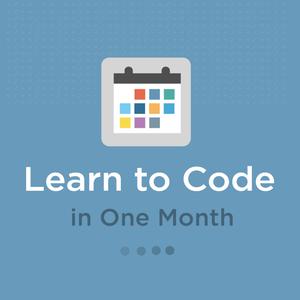
Learn to Code in One Month
Learn to Code
- 18 minutes 32 secondsTop 6 Reasons to Learn SQL in 2025
SQL is the language of databases. In your career, if you plan to work with machine learning, artificial intelligence, build websites or apps or work with data analytics, you're going to need to know SQL.
In this episode of the Learn to Code podcast I'm going to dive deep into the top 6 reasons why you should be learning SQL. I'll cover:
* What is SQL? * How popular is SQL? * What famous websites use SQL? * SQL vs. Python? * Excel vs. SQL Databases
1. What's SQL? SQL is the language of databases. In your career, if you plan to develop apps, work with business analytics, or process data for artificial intelligence (AI) bots— you're going to need to know SQL. 2. What companies use SQL? Netflix, Airbnb, Uber, Twitter, Amazon, Google, Dropbox, Shopify, and thousands more. 3. So, you're saying SQL is a popular programming language? Yes! According to StackOverflow, it’s the third most popular programming language.
28 December 2024, 4:00 pm - 35 minutes 20 secondsThe Best SEO Tools for 2025
Today on the Learn to Code Podcast I’m talking with my favorite SEO nerd: Kenny Kline of JAKK Media! Kenny joined us recently to discuss how to land a job in content marketing, today Kenny and I are discussing SEO best practices and tools for 2020.
You'll learn: * How to keep up with Google's ever-changing SEO algorithm * Top SEO content strategies for link building * How AHREFS changed my life * When to use AHREFS vs. Google Search Console
Episode Show Notes and Full Transcript
The Learn to Code Podcast is available on iTunes, Spotify, Stitcher, and YouTube. Follow One Month on Facebook and Twitter.
15 December 2024, 4:00 pm - 31 minutes 32 secondsWhy are MBAs Learning Python?
This week on the Learn to Code Podcast Mattan Griffel, award-winning teacher of the Introduction to Programming Using Python course at Columbia Business School, and I discuss the question: “Why are MBAs learning to code?”
Over the past four years, Mattan has taught thousands of MBAs. Recently he has begun work on a textbook to scale his curriculum to business schools all around the country titled Python for MBAs.
In this episode, we’ll discuss why entrepreneurs and managers are using Python to automate routine tasks. We’ll look at student use cases, and how and why Python does a better job at data analysis than more traditional tools like Excel.
Episode Show Notes and Full Transcript
The Learn to Code Podcast is available on iTunes, Spotify, Stitcher, and YouTube. Follow One Month on Facebook and Twitter.
19 November 2024, 5:00 pm - 48 minutes 21 secondsHow to Land a Job in Content Marketing — with Kenny Kline
You’ve launched your first website. It’s a big day! You want to throw a party, crack a beer, and high-five everyone you see. Except, there’s no one around — zero comments on your blog and your site doesn’t even show up in any Google rankings.
This week on the podcast, I’m chatting with Kenny Kline (JAKK Media), who’s built a multi-million dollar business helping drive organic traffic to his client’s websites.
IMHO Kenny is the #1 content marketing guru in New York. Over the years, I’ve learned so much from Kenny that has helped drive 2-3x more traffic to OneMonth.com. That’s why I’m especially excited to share this episode. You’ll learn how Kenny Kline learned to code, what a content marketer does, and how to gain the skills necessary to apply for your dream content marketing job!
The Learn to Code Podcast is available on iTunes, Spotify, Stitcher, and YouTube. Follow One Month on Facebook and Twitter.
5 October 2024, 4:00 pm - 22 minutes 50 seconds6 Reasons Why You’ll Never Learn to Code
A few years ago, David Heinemeier Hansson (Ruby on Rails creator) made a confession on Twitter: "I look up code on the internet all the time." David's confession went viral. Within a few hours, dozens of developers began to make similar confessions — all challenging the conventional idea of what most people think it means to be a "real developer."
What the trend "Developer Confessions" has taught us is that developers don't know EVERYTHING. (Phew, what a relief!)
In this latest episode of the Learn to Code Podcast I break down the 6 Reasons Why You'll Never Learn to Code, and make my own developer confession. (Geez, I have so so so many developer confessions — hope you're ready).
6 Reasons Why You'll Never Learn to Code (article w/ links and examples) https://learn.onemonth.com/6-reasons-why-youll-never-learn-to-code/
Developer Confessions: https://twitter.com/i/events/835969005668220930?lang=en
Learn to Code with One Month ►https://www.onemonth.com/
STAY TUNED: One Month ► https://www.onemonth.com/ YouTube ► https://youtube.com/c/onemonth Facebook ►https://www.facebook.com/OneMonthEdu/ Podcast ►https://learn.onemonth.com/learn-to-code-podcast/
18 August 2024, 4:00 pm - 12 minutes 8 secondsThe Complete Guide to Learn SQL in Just 15 Minutes for Free
SQL is the language of databases, and SQL programmers are in high demand. This week, I want to share how to learn SQL for free — and in your spare time — during quarantine. All you need to get started is access to an MYSQL database, as well as some datasets to play around with.
1. Install a Database — If you want to learn SQL, you’re going to need a SQL database. One of the easiest ways to get a database is to register for a shared hosting account. If you go to hostgator.com and enter the code “onemonthcode,″ you’ll gain access to a MYSQL database for only $0.01 (for the first month). Once you’re in the control panel (or cPanel) click the option to create a new database. Then, click on “PHPMyAdmin” for access to your MYSQL database. Watch this video on setting up shared hosting to learn more.
2. Download a (Free) SQL Dataset — In order to learn SQL, you need a dataset. I've included a free SQL dataset (.sql file) that you can download and upload to your MYSQL database.
Open it in Sublime Text, or any text editor, right now, and you can see! Once you’ve completed the MYSQL installation, go to your MYSQL database and click “Import” to import this .sql file.
3. Discover some great resources! My favorite SQL book is Sams Teach Yourself SQL in 10 Minutes by Ben Forta! They say only 10 minutes a day, but you’ll find all the knowledge you need to write SQL statements in this tiny book. One of my favorite free online resources for SQL code is W3Schools. They have some pretty great SQL quizzes you can try out too!
Once you’re ready to ramp things up and become a true SQL expert, consider signing up for my 30-day One Month Learn SQL course. During the course, you’ll learn to read, write, query, and analyze data using 20+ of the most popular SQL commands.
1 August 2024, 4:00 pm - 29 minutes 51 secondsWordPress Security for Beginners
33% of the web is powered by WordPress. There's a lot of WordPress sites out there! Because of that, WordPress is a huge target for hackers, and security should be a priority for everyone, even if you're not a developer.
In this episode, I chat with Jason Cohen, CTO of WPEngine, about what WordPress security for beginners. We discuss:
- The best plugins for keeping your WordPress sites secure.
- How to know if your WordPress site is already hacked
- What you can do if you think your WordPress site is hacked
- Pros and cons of the various types of WordPress hosting that are out there. Everything from WordPress.com, to shared hosting, to manage WordPress hosting solutions.
- Jason's thoughts on WordPress Jetpack, Automatic (the company behind WordPress)'s default WordPress security plug-in.
Episode Show Notes and Full Transcript
The Learn to Code Podcast is available on iTunes, Spotify, Stitcher, and YouTube. Follow One Month on Facebook and Twitter.
13 July 2024, 4:00 pm - 54 minutes 44 secondsHow I Learned to Code Hacking WordPress — with Zapier Co-Founder Bryan Helmig
This week on the podcast I'm chatting with Bryan Helmig, the CTO, and co-founder of Zapier. In our discussion, we talk about how Bryan learned to code, how One Month uses Zapier's automation tools to save us time and $$$, AND our list of The Most In-Demand Tech Skills.
Episode Show Notes and Full Transcript
The Learn to Code Podcast is available on iTunes, Spotify, Stitcher, and YouTube. Follow One Month on Facebook and Twitter.
6 July 2024, 4:00 pm - 11 minutes 57 secondsFront-end vs. Back-end Developers | What's the Difference?
What's the difference between front-end and back-end coding? Whether you're hiring a developer, becoming a developer, or just getting started learning to code — you're going to need to know the difference between the two terms "front-end" and "back-end."
In this SHORTS episode of the Learn to Code Podcast I'm going to explain the differences in terms of skill level, programming languages, and salary.
Front-end developers primarily use three languages: HTML, CSS, Javascript. While back-end developers will choose at least one of the following programming languages are PHP, Ruby, Python, Node.js, and Java.
The Learn to Code Podcast is available on iTunes, Spotify, Stitcher, and YouTube. Follow One Month on Facebook and Twitter.
27 April 2024, 4:00 pm - 47 minutes 39 secondsBrett Martin — Business School vs. Coding School
Brett Martin teaches Digital Literacy for Decision Makers (with me!) at Columbia University Business School. In this conversation, we share our curriculum, notes, and stories teaching digital literacy to MBAs.
In this lesson you'll learn:
- Brett's definition of digital literacy
- How to tell if someone is digitally literate
- Types of digital literacy
- Coding literacy vs. Digital Literacy
- The tectonic forces that shape internet culture
- A brief history of the internet
- Why MBAs at Columbia University are learning to code
Who is Brett Martin?
Brett Martin is the co-founder and managing partner of Charge Ventures, which works with early-stage companies trying to get funding here in Brooklyn, New York. Brett has quite a legacy of working on some fantastic products. He co-founded a company called Switch, which is a mobile job discovery application, as well as Sonar, an app that I used to use back in the day. He's written for Harvard Business Review and helped launch a little known website called Vice. Yeah, he helped launch the original Vice website. So, he's done quite a few amazing things.
30 March 2024, 4:00 pm - 25 minutes 27 secondsHow I Learned to Code in 6 Months with Meaghan Jones of Hotjar
Meaghan Jones (@meaghanwonder) graduated from UC Berkeley with a Masters in Latin America Studies. Having grown up in California, Meaghan always dreamed of working and living abroad. She loved Latin America, and so "Latin American Politics" seemed like her to working abroad!
She arrived in Brazil, and hit a wall. At first, Meaghan had a difficult time getting work. She ended up teaching English for a few months, but always had the feeling that she could be doing something more, she wanted to work somewhere that she could continue actively learning on the job, and she wanted a job that matched her creative potential. Meaghan returned to the States, and that’s when she joined Epicodus, a coding bootcamp in Portland, OR. Meaghan worked hard, and learned to code in just 6 months. Since graduating from Epicodus's coding bootcamp Meaghan has landed a job at Hotjar, working remotely from San Paolo, Brazil.
(Meaghan is also One Month alumni! When Meaghan joined Hotjar she enrolled in One Month’s Learn Python course, and we met soon after!)
Full story > https://learn.onemonth.com/how-i-learned-to-code/
Visit www.onemonth.com for the podcast transcript, links mentioned in this episode, and to listen to more episodes of the Learn to Code Podcast.
23 March 2024, 4:00 pm - More Episodes? Get the App
Your feedback is valuable to us. Should you encounter any bugs, glitches, lack of functionality or other problems, please email us on [email protected] or join Moon.FM Telegram Group where you can talk directly to the dev team who are happy to answer any queries.
 Software Engineering Daily
Software Engineering Daily
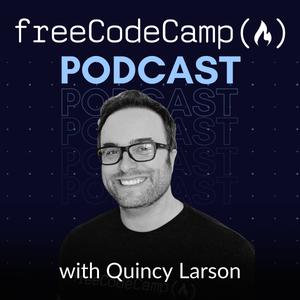 freeCodeCamp Podcast
freeCodeCamp Podcast
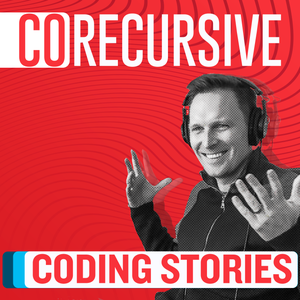 CoRecursive: Coding Stories
CoRecursive: Coding Stories
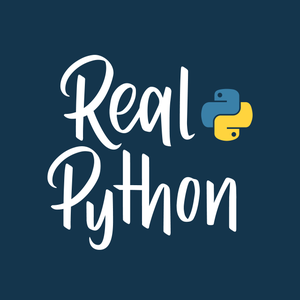 The Real Python Podcast
The Real Python Podcast
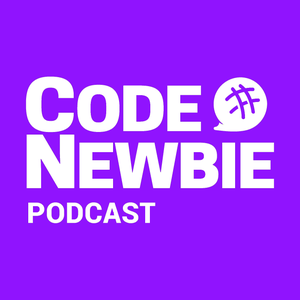 CodeNewbie
CodeNewbie
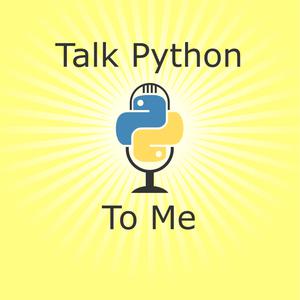 Talk Python To Me
Talk Python To Me